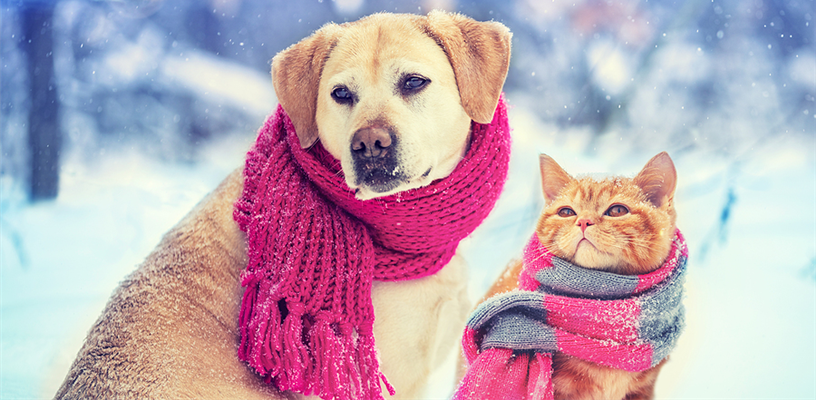
- By Shae King
- Posted Tuesday, February 16, 2021
Keep Your Pets Warm and Safe This Winter
To keep your furry companion safe and sound this winter, here are a few safety tips provided by the American Veterinary Medical Association (AMVA).
Winter wellness: When was the last time your pet had a wellness exam? According to AMVA, your pet should have a preventative care exam at least once a year. The cold temperatures may also potentially worsen any medical conditions your pet may have. A up to date wellness check up is very essential to ensure your companion is ready and healthy for the winter weather.
Know the limits: Know your pet and their tolerance level for winter weather in order to prepare accordingly. Tolerance levels for cold temperatures vary from pet to pet due their coat, body fat, level of activity, as well as their overall health. Dogs with long or thick haired coats such as Huskies are more cold-tolerant, however they are still at risk. Both short haired and short legged pets get cold quicker due to less protection along with their bellies and bodies being closer to the group. Young and older pets with medical issues such as diabetes, and heart disease are at risk as well because they have a hard time regulating their body temperature. Pets with arthritis may slip or fall as well. Be sure to reach out and consult your veterinarian if you are unsure or need assistance determining your pet’s temperature limits.
Stay inside:
True or False: Dogs and cats are more resistant to winter temperatures because of their fur.
Verdict: False!
It is indeed a common misconception that cats and dogs seem to be more resistant to cold weather than humans due to their hair, but it’s completely false. Similar to humans, pets are vulnerable to frostbite and hypothermia and should be kept indoors. Longer-haired and thick-coated dog breeds, such as huskies and other dogs born in colder climates, are more tolerant of cold weather; but no pet can be kept outdoors for long stretches of time under freezing.
Provide shelter: AMVA is not an advocate leaving for any pet out for long periods of time, however if you are unable to keep your dog or cat inside during cold weather, have a safe, strong protection from the snow. Try to ensure they have limitless access to hot, unfrozen water (by changing the water frequently or using a pet-safe, heated water bowl). The shelter bottom should be off the ground (to prevent heat loss to the ground) as well as the bedding should be thick, dry and periodically adjusted to provide a warm, dry climate. The door to the shelter should also be placed away from the prevailing winds.
Make some noise: Before pulling out of your driveway on your way to work, be sure to check underneath your car, honk the horn, and even bang on the hood. Reason for this is because cats love to stay warm and your car engine is a heat source for them to keep warm.
Be prepared: Winter season also brings the possibility of extreme winter weather, blizzards and power outages. Start preparing a disaster/emergency plan and incorporate your pet in your planning and preparation. Have more than enough food, water and medication (including some prescription drugs as well as heartworm and flea/tick prevention) on hand to get by for at least 5 days.
Collar and chip: Numerous pets get lost in winter as snow and ice may disguise familiar scents that would usually allow your pet to find his or her way back home. Please ensure your pet has a well-fitting collar with up-to-date identification and phone number. A microchip is a much more permanent means of identification, but it is essential to keep your registration up to date.
For more information on how to keep your pet safe this winter, visit amva.org
https://www.avma.org/resources-tools/pet-owners/petcare/cold-weather-animal-safety






